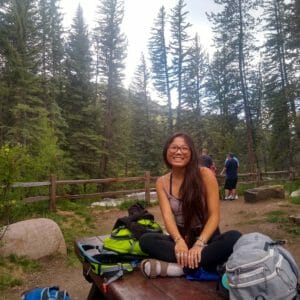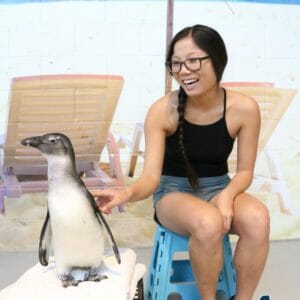Megan Warner just graduated with a Bachelor of Science in sustainability. As someone who has been dedicated to sustainability from an early age, completing the program was a dream come true.
“This program will change you in profound ways,” Warner said. “I learned how to be mindful of the uncomfortable and inspiring feelings that sustainability brings.”
In the following Q&A, read about Warner, her advice to those still on the journey of obtaining a degree, and her plans for the future.
Question: What was your “aha” moment, when you realized you wanted to study sustainability?
Answer: My “aha” moment was when I heard the word “sustainability” for the first time from Brigitte Bavousett in my AP Biology class. Brigitte came to my high school to talk about the program, handed out recycled pencils to us, and at the end asked: “Does anyone think they would want to study this?” My hand shot straight up. It was a magical moment. I felt like sustainability was something I was meant to do for the rest of my life.
Q: What’s something you learned while at ASU — in the classroom or otherwise — that surprised you, that changed your perspective?
A: In my corporate sustainability class taught by the amazing Colin Tetreault, I was very shocked, yet motivated to know that businesses are not inherently bad. I grew up with preconceived notions that corporations align all of their interests with profits and result in excessive consumption, but it was fascinating to learn from corporate leaders about their strategic, pragmatic passion to help people and the planet at the same time. Not only that, I still keep up with the news in the corporate sustainability world. I am amazed how sustainability is actively being integrated within companies in their reporting, philanthropy, and missions.
Q: Which professor taught you the most important lesson while at ASU?
A: Professors David Manuel-Navarrete and Neda Movahed inspired me in cultivating inner sustainability. They taught me the most personal lesson, which is to always find your inner power and it will fuel you through your journey of learning. I learned how to be mindful of the uncomfortable and inspiring feelings that sustainability brings. I built compassion, resilience, and friendships in my time with them. I was inspired by their teaching methods which created a culture of acceptance and a classroom in which students played an active role in shaping their learning.
Q: What’s the best piece of advice you’d give to those still in school?
A: My best piece of advice is to think about how sustainability resonates in the rest of your life, outside of your classes. This program will change you in profound ways. Consider that your definition of sustainability will change nearly every day. Be positive and empower others.
Q: What was your favorite spot on campus, whether for studying, meeting friends or just thinking about life?
A: My favorite spot on campus was outside of the Student Services building. There are little tables and a desert garden. I would get wifi, fresh air, and a clear mind to study outside.
Q: What is a key insight you gained from working with sustainability education?
A: In my time at ASU, I taught some form of sustainability education in various places, including a family camp, a charter school, a science camp, an aquarium, a business, and a juvenile detention center. My key insight is that powerful learning happens everywhere. I was energized by going into sustainability education because I grew up going to a family camp in Pennsylvania since I was seven. I spent my childhood playing outside, grew up with my friends across the country, and developed a sense of place and purpose.
My experience growing up at camp set me up for leadership experiences. Family camp is a reminder that leisure is learning, too. I gained a desire to increase access to the outdoors for all by working with youth, adults, and animals alike. My key insight is that climate change will affect everyone in some way. As sustainability educators, we should strive to build the capacity of underserved populations and future leaders by allowing the concept of education to be more flexible, accommodating, and energizing.
Q: Now that you’ve graduated, what are your plans?
A: Right now, I am currently on the job hunt. I have a couple part-time jobs teaching kids character education, yoga, mindfulness, and art. I would like to explore sustainability education in nonprofits, businesses, and informal educational institutions such as camps, museums, and recreation centers. I hope to return to SOS for my master’s degree. I am interested in developing education for sustainable consumption. Ideally, I would like a job where I can be outside or interacting with people regularly. I feel suppressed by screens and sitting, so I am looking for a job that is active and challenges me differently each day. I might be picky, but I am hopeful that sustainability will continue to create jobs that have never existed before.
Q: If someone gave you $40 million to solve one problem on our planet, what would you tackle?
A: If I had $40 million to solve one problem, I would open up outdoor schools across the world. I believe this would address many challenges, such as technology and social media consumption, poor nutrition, obesity, and mental health for youth and young adults. I also think that kids with learning disabilities are still not getting the resources and learning environments to be successful in. In addition, kids need to feel empowered in learning. Teaching outside shows kids that chaos and conflict happen, and the lesson plan could change just as the weather conditions change. Being outside forms the most personal relationship with nature. This translates to how you see the world and how you see interconnections.
Q: Is there anything else you’d like to add?
A: Be mindful of all beings, cultivate warmheartedness, and play outside!

